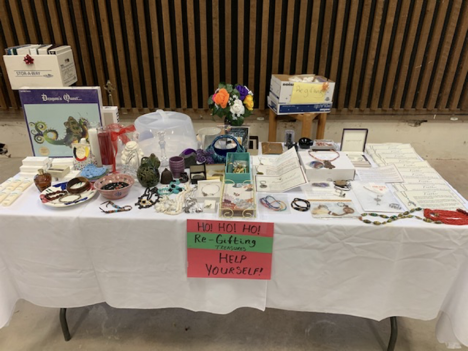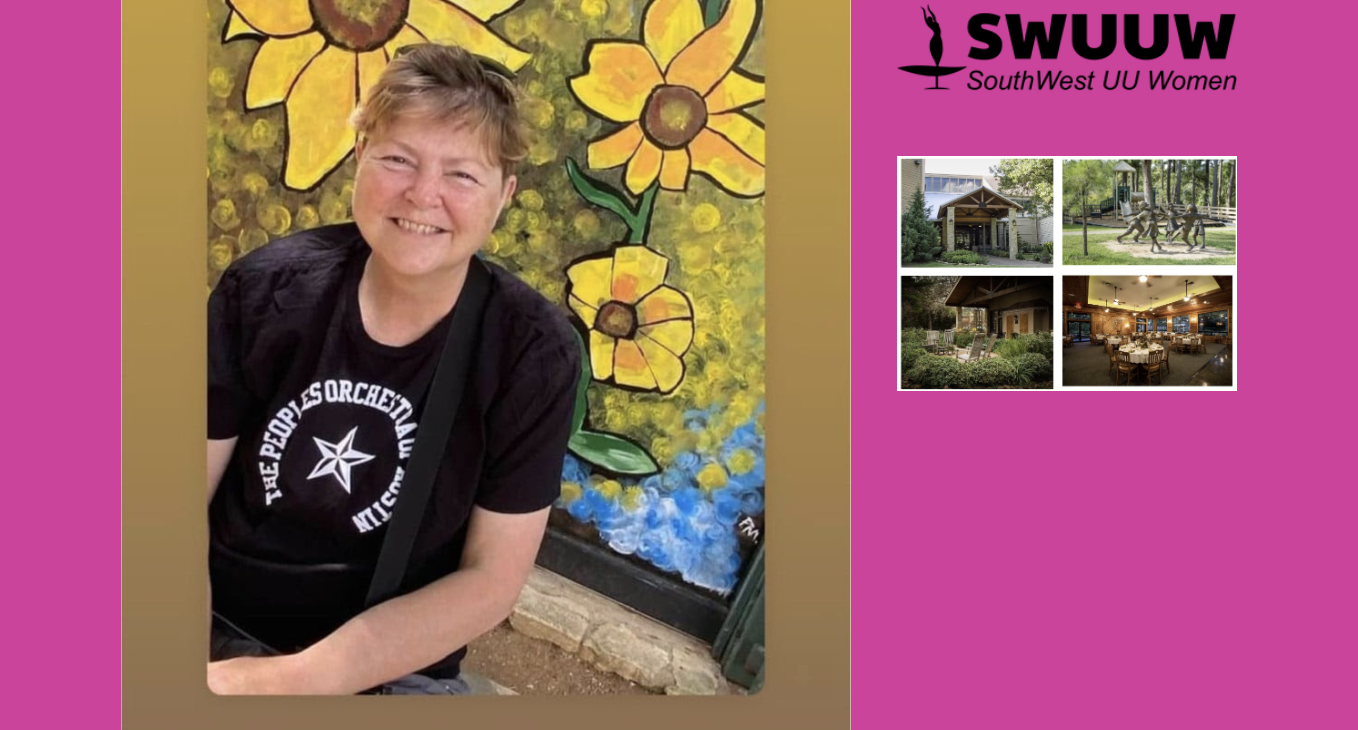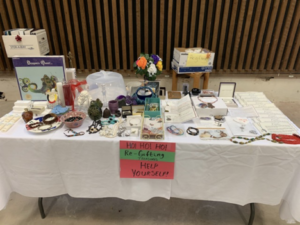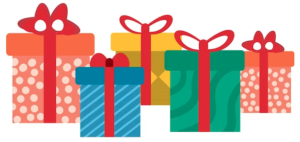Podcast: Play in new window | Download
Listen to the sermon by clicking the play button above.
Rev. Chris Jimmerson & Rev. Michelle LaGrange
December 24th, 2023
First UU Church of Austin
4700 Grover Ave., Austin, TX 78756
www.austinuu.org
On Christmas Eve we hold our annual Lessons and Carols service featuring beautiful, holiday-related readings and singing carols together. We join together for this magical day of celebrating love, joy, and peace.
Chalice Lighting
On this night of anticipation, we raise our voices in story and song to greet Christmas. May the lessons of compassion, trust, and generosity alight within us and lead us into the new day, renewed.
Opening Words
CHRISTMAS EVE
by Rev. Mary Wellemeyer (adapted)Like those shepherds who were on the hillsides with their flocks,
like those wise ones in their observatories with their telescopes and astronomical charts,
we find our daily work interrupted by these holy days.And like them, we cannot keep on working, we must stop and listen to the
singing of the angels, and feel the call of that special star,The little town of Bethlehem is thronged with people who have come to be taxed,
crowding streets and shops, and we must wind our way to an unknown place
where a wonderful new beginning awaits.What precious new beginning are you seeking this night?
For what do you push through the crowds?
What message do the angels sing to you?
What is the call of your star?
Anthem:
“Cantique de Noel” (Adolphe Adam)
Katrina Saporsantos & Gabriel Liboiron-Cohen, vocals;
Benjamin Dia, piano
Reading
COME INTO CHRISTMAS
by Ellen FayIt is the winter season of the year
Dark and chilly
Perhaps it is a winter season in your life.
Dark and chilly there, too
Come in to Christmas here,
Let the light and warmth of Christmas brighten our
lives and the world.
Let us find in the dark corners of our souls the
light of hope,
A vision of the extraordinary in the ordinary.
Let us find rest in the quiet of a holy moment to
find promise and renewal.
Let us find the child in each of us, the new hope,
the new light, born in us.
Then will Christmas come
Then will magic return to the world.
Carol “O Come All Ye Faithful”
Reading
THE SHORTEST DAY
by Susan CooperSo the shortest day came, and the year died,
And everywhere down the centuries of the snow-white world
Came people singing, dancing,
To drive the dark away.
They lighted candles in the winter trees;
They hung their homes with evergreen;
They burned beseeching fires all night long
To keep the year alive,
And when the new year’s sunshine blazed awake
They shouted, reveling.
Through all the frosty ages you can hear them
Echoing behind us – Listen!!
All the long echoes sing the same delight,
This shortest day,
As promise wakens in the sleeping land:
They carol, fest, give thanks,
And dearly love their friends,
And hope for peace.
And so do we, here, now,
This year and every year.
Welcome Yule!
Carol “Joy to the World”
Reading
CHRISTMAS IS SUBVERSIVE
by Rev. Kendyl GibbonsOne of the great things about Christmas is that it is a sturdy holiday. Christmas doesn’t wimp out when times are hard – it comes anyway, even if there are hardly any presents, even when there isn’t much food to make a feast with, even if you’re sad, even if the world around you is at war, even if you are living in fear and danger and oppression, Christmas still comes.
And when it comes, Christmas is subversive. Christmas, with its story of an unwed mother and a doubtful father; with its legend of a helpless baby, born in a stable, who was worshipped by some of the wisest, richest men in the world; with its tale of the child pursued by the deadly wrath of kings, who escaped as a refugee to a foreign land far from home.
Christmas, with its ancient, enduring summons of peace on earth, good will to all people, everywhere. You can’t stop a day like that with a little hardship, or greed, or injustice. It will show up anyway, shining the light of a midnight star into the darkest places of our collective lives.
Do not underestimate the power of the manger, and the hope it holds. The Christmas song of the angels is not as innocent as it sounds. It has turned the world upside down before now. It still can.
Carol “Angels We Have Heard on High”
Reading
Luke 2:1-7
In those days Caesar Augustus issued a decree that a census should be taken of the entire Roman world. This was the first census that took place while Quirinius was governor of Syria. And everyone went to their own town to register. So Joseph also went up from the town of Nazareth in Galilee to Judea, to Bethlehem the town of David, because he belonged to the house and line of David. He went there to register with Mary, who was pledged to be married to him and was expecting a child. While they were there, the time came for the baby to be born, and she gave birth to her firstborn, a son. She wrapped him in cloths and placed him in a manger, because there was no guest room available for them.
Reading
A CAUTIONARY CHRISTMAS TALE
by Rev. Frank Rivas (adapted)My little sister, Renee, was ten years younger than I. When she was in kindergarten, I considered her to be the most obnoxious child on this planet.
So I decided to get her a lump of coal for Christmas. I know that people generally consider it Santa’s responsibility to give lumps of coal to kids who misbehave, but I had learned over the years not to trust Santa’s judgment. I’d seen it over and over again; the old man went easy on little kids.
So the responsibility fell to me. I searched the yellow pages, went to the nearest coal yard, picked out an exceptionally large chunk, wrapped it nicely in a box with a bow and placed it under the Christmas tree.
Our family encouraged recipients to lift, shake, and guess at the contents as soon as a gift was under the tree. Renee was fascinated. What gift could weigh so much?
By our Christmas morning tradition, the gifts were sorted into five piles; then one at a time, going around the circle as many times as necessary, we opened our gifts for everyone to see.
Renee opened mine first. As she unwrapped ribbon, paper and box, her excitement grew. My excitement grew too; the moment of reckoning was at hand. From her first glance at the coal she loved it. She screamed with delight and hugged me profusely.
How was I to know that only a week earlier, in her kindergarten class, she had learned to grow colorful crystals on coal. How was I to know that this would be her favorite gift?
There’s a moral to this story, my friends. Watch out for this season. There’s a spirit in the air that can turn even the most vindictive thoughts into good deeds.
Reading
Luke 2:8-14
And there were shepherds living out in the fields nearby, keeping watch over their flocks at night. An angel of the Lord appeared to them, and the glory of the Lord shone around them, and they were terrified. But the angel said to them, “Do not be afraid. I bring you good news that will cause great joy for all the people. Today in the town of David a Savior has been born to you; he is the Messiah, the Lord. This will be a sign to you: You will find a baby wrapped in cloths and lying in a manger.”
Suddenly a great company of the heavenly host appeared with the angel, praising God and saying, “Glory to God in the highest heaven, and on earth peace to those on whom his favor rests.”
Hymn #244: “It Came upon a Midnight Clear”
Reading
Luke 2:15-20
When the angels had left them and gone into heaven, the shepherds said to one another, “Let’s go to Bethlehem and see this thing that has happened, which the Lord has told us about.”
So they hurried off and found Mary and Joseph, and the baby, who was lying in the manger. When they had seen him, they spread the word concerning what had been told them about this child, and all who heard it were amazed at what the shepherds said to them. But Mary treasured up all these things and pondered them in her heart. The shepherds returned, glorifying and praising God for all the things they had heard and seen, which were just as they had been told.
Reading
EACH NIGHT A CHILD IS BORN
Sophia Lyon Fahs (adapted)For so the children come
and so they have been coming.
Always in the same way they came-
Born of the seed of life.
No angels herald their beginnings.
No prophets predict their future courses.
no wise ones see a star to show where to find
The babe that will save humankind.
Yet each night a child is born is a holy night.
Parents
Sitting beside their children’s cribs-
Feel glory in the sight of a new beginning.
They ask “Where and how will this new life end?
Or will it ever end?”
Each night a child is born is a holy night-
A time for singing-
A time for wondering
A time for worshiping.
Carol No. 245: “Joy to the World”
Reading
THE CAMELS SPEAK
by Lynn UngarOf course they never consulted us. They were wise men, kings, starreaders, and we merely transportation.
They simply loaded us with gifts and turned us toward the star.
I ask you, what would a king know of choosing presents for a child?
Had they ever even seen a baby born to such simple folks, so naked of pretension, so open to the wind?
What would such a child care for perfumes and gold?
Far better to have asked one born in the desert, tested by wind and sand.
We saw what he would need: the gift of perseverance, of continuing on the hard way, making do with what there is, living on what you have inside.s
The gift of holding up under a burden, of lifting another with grace, of kneeling to accept the weight of what you must bear.
Our footsteps could have rocked him with the rhythm of the road, shown him comfort in a harsh land, the dignity of continually moving forward. But the wise men were not wise enough to ask.
They simply left their trinkets and admired the rustic view. Before you knew it, we were turned again toward home, carrying men only half-willing to be amazed.
But never mind.
We saw the baby, felt him reach for the bright tassels of our gear. We desert amblers have our ways of seeing what you chatterers must miss. That child at heart knows something about following a star.
Our gifts are given.
Offering
“Carol of the Bells” (Mykola Leontovych; arr. Margaret Goldstone)
Benjamin Dia, piano
Reading
A RITUAL OF THE WINTER SOLSTICE FIRE
Rev. Michelle LaGraveand Rev. Chris JimmersonLet us take into our hands a Christmas candle, a Solstice candle
this is a night of ancient joy and ancient fear
those who have gone before us were fearful of what lurked
outside the ring of fire, of light and warmth.As we light this fire we ask that the fullness of its flame
protect each of us from what we fear most
and guide us towards our perfect light and joy.May we each be encircled by the fire and warmth of love
and by the flame of our friendship with one another.On this night, it was the ancient custom to exchange gifts
of light, symbolic of the new light of the sun.Therefore make ready for the light!
Light of star, light of candle,
Firelight, lamplight, love light
Let us share the gift of light.
Candle Lighting: “Silent Night, Holy Night” (Instrumental)
Carol “Silent Night, Holy Night”
Reading
THE WORK OF CHRISTMAS
by Howard ThurmanWhen the song of angels is stilled,
When the star in the sky is gone,
When the kings and princes are
home,
When shepherds are back with
their flock,The work of Christmas begins:
to find the lost,
to heal the broken,
to feed the hungry,
to release the prisoner,
to rebuild the nations,
to bring peace among the brothers,
to make music in the heart.
Extinguishing the Chalice
We extinguish this flame but not the light of truth, the warmth of community, or the fire of commitment. These we hold in our hearts until we are together again.
Closing Words
KNEELING IN BETHLEHEM by Ann Weems
It is not over, this birthing.
There are always newer skies
into which God can throw stars.
When we begin to think
that we can predict the Advent of God,
that we can box the Christ in a stable in Bethlehem,
that’s just the time that God will be born
in a place we can’t imagine and won’t believe.
Those who wait for God
watch with their hearts and not their eyes,
listening, always listening for angel words.
Singing Together
WE WISH YOU A MERRY CHRISTMAS
We wish you a merry Christmas
We wish you a merry Christmas
We wish you a merry Christmas and a happy new year
Good tidings we bring to you and your kin
We wish you a merry Christmas and a happy new yearOh, bring us some figgy pudding
Oh, bring us some figgy pudding
Oh, bring us some figgy pudding
And bring it right hereGood tidings we bring to you and your kin
We wish you a merry Christmas and a happy new yearWe won’t go until we get some
We won’t go until we get some
We won’t go until we get some
So bring it right hereGood tidings we bring to you and your kin
We wish you a merry Christmas and a happy new yearWe all like our figgy pudding
We all like our figgy pudding
We all like our figgy pudding
With all its good cheersGood tidings we bring to you and your kin
We wish you a merry Christmas and a happy new yearWe wish you a merry Christmas
We wish you a merry Christmas
We wish you a merry Christmas and a happy new year
Most sermons during the past 23 years are available online through this website. Click on the index link above to find tables of all sermons for each year listed by date (newest to oldest) with topic and speaker. Click on a topic to go to that sermon.
Podcasts of this and other sermons are also available for free on iTunes. You can find them by clicking on the podcast link above or copying and pasting this link. https://itunes.apple.com/podcast/first-unitarian-universalist/id372427776







 The Keynote Speaker and Conference Musician will be
The Keynote Speaker and Conference Musician will be
